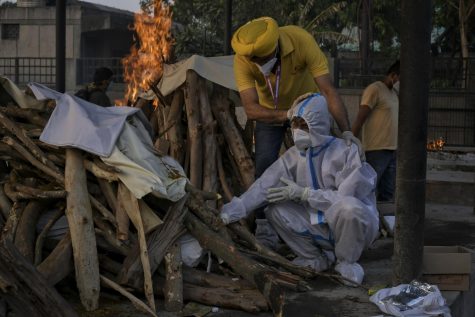COVID-19 crisis in India leaves lasting impact on international Columbia students
May 21, 2021

Sankalp Tambe’s father is a pediatrician and his mother is a general physician working on the front lines of the COVID-19 outbreak in India. Tambe, an international graduate student from India in his second year of the Masters of Arts Management program, said both of his parents tested positive for COVID-19 in April.
“My initial reaction toward this was just fear because we had already seen a lockdown full of mismanaged operations and some problems and crises that India, as a country, had never seen or experienced before,” Tambe said. “It was definitely something new and scary for the whole country to deal with.”
Despite Tambe’s mother being the first of the 100 doctors in the state of Maharashtra to receive a COVID-19 vaccine, she still contracted the virus and had to be taken to the hospital after experiencing complications. Due to high demand, Tambe said the ambulance charged between 8,000 and 10,000 rupees, or $109 to $137, to take her to the hospital less than a mile away. Before the COVID-19 pandemic, the same ambulance ride typically cost about 1,000 rupees, or $13.
“Both of [my parents] were dealing with something that was really disturbing and it wasn’t a good feeling to just watch them feeling helpless, being thousands of miles away from them,” Tambe said. “My first response was, ‘If there is need, I’m going to leave right away.’”
Tambe said the news about the COVID-19 outbreak and his parents’ circumstances affected his schoolwork as he “began slacking on [his] work a lot.” Tambe said he tried to keep professors informed about the situation at home but had times when he could not be responsive.
“On one side my mind was stuck here, and on the other side, I had the pressure of finishing assignments and papers by the deadline,” Tambe said.
Tambe is now in Seattle with his sister. His parents have recovered from COVID-19 and are back at work in India. He wants to see his family but said it is not safe right now.
Mohit Sengupta, a senior audio arts major and Tambe’s roommate, said he was also affected by the COVID-19 crisis in India. His father and several other members of his family contracted the virus.
Sengupta said India’s prime minister, Narendra Modi, and his party are focusing more on elections than handling the pandemic.
“When we started developing vaccines he ended up selling most of our vaccines away and once India’s cases started going up, we had little to no vaccines left in the country,” Sengupta said.
Modi’s political opponents have strongly criticized him for exporting vaccines while his people suffered, according to an article in Reuters.
On April 16, the U.S. declined The Serum Institute of India’s request to lift the export limitation on raw materials needed for the COVID-19 vaccine production, according to WION news. Sengupta said he is disappointed by this.
“We were personally one of the world’s biggest manufacturers of the COVID vaccine,” Sengupta said. “I don’t know if countries realize this, but if they try and not help India right now, in the long term you’re pretty much slowing down the ability for the whole planet to be vaccinated for COVID.”
Sewa International, a nonprofit Hindu faith-based organization, raised nearly $8 million on Facebook to buy and send oxygen concentrators to India.
Dipti Desai, coordinator of Sewa’s Chicago Chapter, said they started with a target goal of $500,000, but people kept donating more, and the target goal has increased since then to $10 million.
Desai said they encountered a lot of logistical challenges when sending supplies, but fortunately, UPS and Air India provided shipping services for free, and the Indian government lifted the taxes.
Sewa sent over 4,000 oxygen concentrators and continues to send humanitarian help to India every day, Desai said.
Right now, Desai said Sewa International is in need of volunteers who can help with logistics, such as figuring out where oxygen concentrators need to get shipped and working with suppliers, four to five hours a day.
“I have family in India, so when we heard about the second wave coming it was very frustrating, devastating—it feels as if your hands are tied and you could not do anything,” Desai said.







